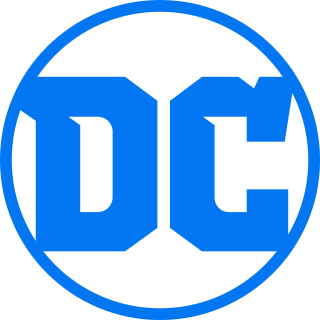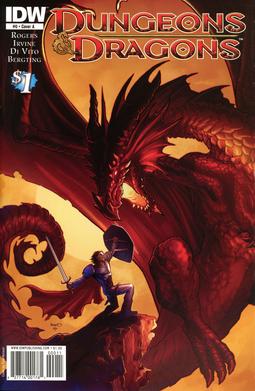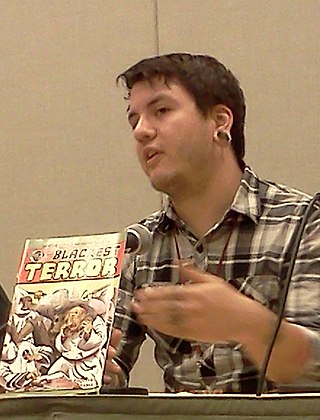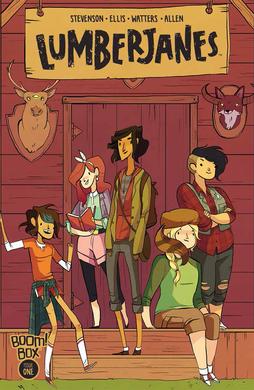
DC Comics, Inc. is an American comic book publisher and the flagship unit of DC Entertainment, a subsidiary of Warner Bros. Discovery.

Vertigo Comics was an imprint of American comic book publisher DC Comics started by editor Karen Berger in 1993. Vertigo's purpose was to publish comics with adult content, such as nudity, drug use, profanity, and graphic violence, that did not fit the restrictions of DC's main line, thus allowing more creative freedom. Its titles consisted of company-owned comics set in the DC Universe, such as The Sandman and Hellblazer, and creator-owned works, such as Preacher, Y: The Last Man and Fables.

IDW Publishing is an American publisher of comic books, graphic novels, art books, and comic strip collections. It was founded in 1999 as the publishing division of Idea and Design Works, LLC (IDW), it formed in 1999, and is recognized as the fifth-largest comic book publisher in the United States, behind Marvel, DC, Dark Horse, and Image Comics, ahead of other comic book publishers such as Archie, Boom!, Dynamite, Valiant, and Oni Press. The company is known for its licensed comic book adaptations of films, television shows, video games, and cartoons.
In comics in the United States, a trade paperback is a collection of stories originally published in comic books, reprinted in book format, usually presenting either a complete miniseries, a story arc from a single title, or a series of stories with an arc or common theme.

Steve Niles is an American comic book author and novelist, known for works such as 30 Days of Night, Criminal Macabre: A Cal McDonald Mystery, Simon Dark, Mystery Society, and Batman: Gotham County Line.
In the field of comic books, a limited series is a comics series with a predetermined number of issues. A limited series differs from an ongoing series in that the number of issues is finite and determined before production, and it differs from a one shot in that it is composed of multiple issues. The term is often used interchangeably with miniseries (mini-series) and maxiseries (maxi-series), usually depending on the length and number of issues. In Dark Horse Comics' definition of a limited series, "this term primarily applies to a connected series of individual comic books. A limited series refers to a comic book series with a clear beginning, middle and end". Dark Horse Comics and DC Comics refer to limited series of two to eleven issues as miniseries and series of twelve issues or more as maxiseries, but other publishers alternate terms.

Gregory Capullo is an American comic book artist and penciller, best known for his work on Quasar (1991–1992), X-Force (1992–1993), Angela (1994), Spawn, Batman (2011–2016), and Reborn (2016–2017). He also drew the DC Comics company-wide crossover storylines Dark Nights: Metal and Dark Nights: Death Metal.

Minx was an imprint of DC Comics that published graphic novels aimed at teenage girls. It ran from 2007 to 2008.
This is a list of comics regarding the Star Trek media franchise.
Sophie Campbell is a comic writer and artist known for her indie comics such as Wet Moon and Shadoweyes, and for her art on the Jem and the Holograms comics, as well as IDW Publishing's ongoing Teenage Mutant Ninja Turtles comic book series. She primarily writes and draws characters who are adolescent or young adult women, including various races, body types, sexual orientations, and abilities. In 2019, she became the lead writer of IDW's Teenage Mutant Ninja Turtles, for which she designed the character Jennika.

Dungeons & Dragons is a series of comic books published by IDW Publishing, under the license from Hasbro and Wizards of the Coast, based on the Dungeons & Dragons (D&D) fantasy role-playing game. Since 2010, IDW Publishing has released two Dungeons & Dragons ongoing series, twelve Dungeons & Dragons limited series, three crossover series and an annual.

Dean Mullaney is an American editor, publisher, and designer whose Eclipse Enterprises, founded in 1977, was one of the earliest independent comic-book companies. Eclipse published some of the first graphic novels and was one of the first comics publishers to champion creators' rights. In the 2000s, he established the imprint The Library of American Comics of IDW Publishing to publish hardcover collections of comic strips. Mullaney and his work have received seven Eisner Awards.

Mariko Tamaki is a Canadian artist and writer. She is known for her graphic novels Skim, Emiko Superstar, and This One Summer, and for several prose works of fiction and non-fiction. In 2016 she began writing for both Marvel and DC Comics. She has twice been named a runner-up for the Michael L. Printz Award.
Star Trek is a comic book series by IDW Publishing, based on the Star Trek science fiction entertainment franchise created by Gene Roddenberry. Since 2007, IDW Publishing has released three Star Trek ongoing series along with many limited series, crossover series and annuals.

Eric Michael Esquivel is a Latino American comic book writer and journalist, known for the 2018 series Border Town, which was cancelled following allegations that he had sexually and emotionally abused a female friend.

James T. Tynion IV is an American comic book writer. He is best known for his work on the Batman franchise at DC Comics, his DC Black Label series The Nice House on the Lake and his independent series The Department of Truth and Something Is Killing the Children.

Lumberjanes is a comic book series created by Shannon Watters, Grace Ellis, Gus Allen, and ND Stevenson and published via the Boom Box! imprint of Boom! Studios. The story follows a group of girls spending summer at a scout camp, and the strange creatures and supernatural phenomena they encounter there. Originally planned as an eight-part series, the comic was made an ongoing series following strong sales and critical acclaim. The comic series came to a close after 75 issues with a one-shot finale in December 2020, ending its six-year-run.
DC Graphic Novels for Young Adults, formerly known as DC Ink, is an imprint of American comic book publisher DC Comics consisting of original one-shots, graphic novels and reprints of books previously published under other imprints. The imprint intends to present traditional DC Universe characters for young adult readers. The first title of the DC Ink imprint, Mera: Tidebreaker, was published on February 2, 2019 and Batman: Nightwalker was the last title to be published under DC Ink. Wonder Woman: Warbringer, the first title of DC Graphic Novels for Young Adults, was published on January 10, 2020.
Vault Comics is an American publisher of comic books. The company is known for its horror, fantasy, and science fiction titles, with a focus on diversity and cross-media properties.











